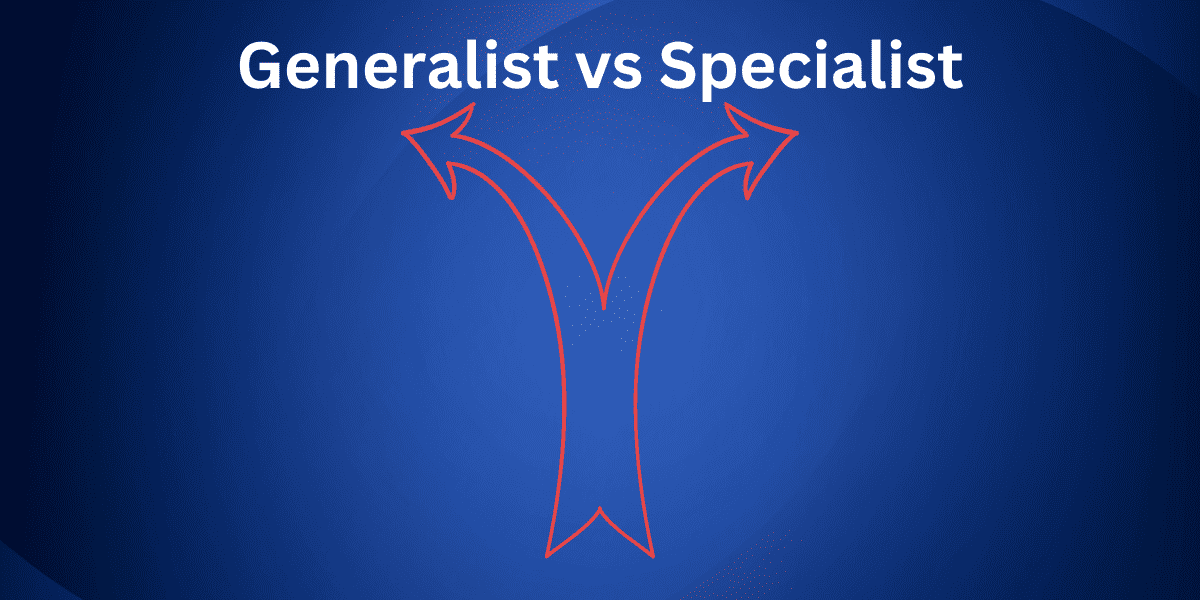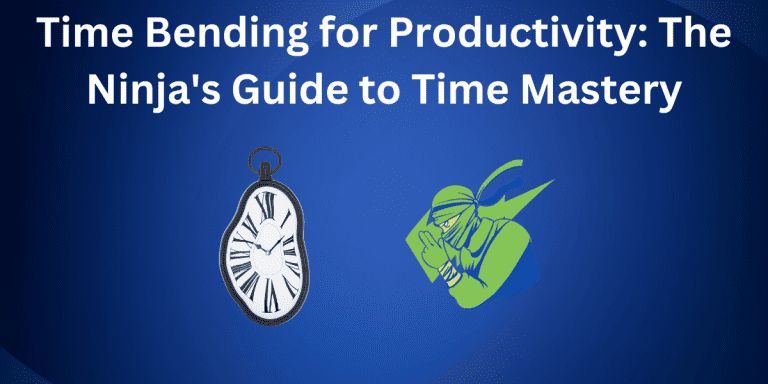Generalist vs Specialized Focus: Achieve 1. Flow 2. Mastery and 3. Balance in a Complex World

Generalist vs Specialized Focus; yes I figured out which is best!
Mastery “A jack of all trades is a master of none, but oftentimes better than a master of one.”
I don’t like the idea of not having enough time and not being able to do all I want because of financial or personal responsibilities. But, I’ve made the mistake before of trying to pursue too many main goals and self-sabotaging because of moving from one unfinished goal to another.
Doing everything led to not being able to do or enjoy anything.
It also led to understanding that I can do more of what I really want without sacrificing my values, finances, or the people who are dearest to me.
Let’s take a high-level look at our lives and the pursuits we are engaged in.
First, you are going to analyze them, and then you will determine where you need to deploy simplification. This will free up space for cognitive resources to help you access flow consistently and with ease.
- Generalist Triumph in a Specialized World
- A Generalist with a Specialized Focus (Seems to Be a Powerful Recipe)
- The Waste of Scattered Focus
- The Power of Singular Focus
- Generalist vs Specialist Focus
- Your To-Do Activity
1. Generalist Triumph in a Specialized World
Do we need to focus on one thing in life for the long term to reach true mastery and hit the upper end of peak performance?
Or do we need to become generalists to thrive in the 21st century?
The challenge we all face is how to maintain the benefit of diverse experience, interdisciplinary thinking, and delayed concentration in a world that increasingly incentivizes or even demands hyper-specialization.
Generalist vs Specialized Focus. What is the Correct Path to Peak Performance?
Should we be hyper-focused on one thing and one thing only for years and maybe even decades on end?
Or will that result in our obliteration as the world becomes increasingly complex and specialized skill sets end up becoming redundant through technological automation?
What is the correct path to peak performance?
The singular focus over decades or generalization and adaptability?
Well, these things are not mutually exclusive.
2. A Generalist with Specialized Focus
A generalist with a specialized focus seems to be a powerful, powerful recipe.
The thing is we can do both a generalist and a specialist.
You can have a singular focus, one mission, one pursuit that you are dedicated to for the long term within which you’re pursuing elite performance, mastery, and expertise, yet simultaneously, you can ensure to be progressing toward that singular focus by gathering a range of experience, of knowledge and focusing on meta-skills.
You can be adaptable and dynamic but you can also have depth in that you have a specific focus or thing you are primarily an expert on.
This breadth and range, combined with expertise and focus, makes us dynamic and makes us powerful.
So if you want a life dedicated to peak performance, craft mastery, and extreme accomplishment, this blend should serve you well.
The focus: We’re going to see results in compound interest and centralization of our resources directed at ONE thing.
Generalization: Ensures that you don’t become rigid or inflexible and you stay ADAPTABLE and dynamic.
3. The Waste of Scattered Focus
Now, unfortunately, this is what a lot of people’s focus looks like.
They are running 1 mile in 1000 different directions rather than running 1000 miles in one direction.
This is a waste of scattered focus: When our time, energy, and attention are going here and here and here we’re ultimately just dispersed and spinning our wheels.
Now, this is the power of singular focus: Here’s what singular focus looks like. When you stack all of these resources together and point them at one thing your ability to go further, faster, compounds exponentially.
This is what the focus of a lot of the world’s most accomplished individuals looks like.
They tend to have one overarching meta focus in one thing they’ve gone incredibly far with that they run a million miles in one direction rather than 1 mile in a million directions.
It’s Not About Time
And this is what happens when you dial in your meta focus, you get concentrated cognition almost like a laser beam that increases its magnification and power.
It all starts to pay off.
And it’s not even that these peak performers are deploying more time, energy, or attention into their pursuits.
It’s actually that they’re deploying it all against one pursuit, which allows them to compound so they can go incredibly far in one thing.
Often when assessing whether to take on another project and disperse our primary focus a little bit, we only look through the lens of time, but we shouldn’t underestimate the degree to which this can fragment our cognition and dilute our attention and energy.
Because often our biggest breakthroughs and ideas, the things that advance us forward in our main pursuits in life take place in non-work time. It takes place in the background cognition like when we shower and have a moment of clarity.
These kinds of times are incredibly important for advancing and for progressing for peak performance.
And if we have multiple pursuits, this background, non-work time, the resources within that are going to be directed towards multiple things and dispersed.
When you disperse the pursuits that you bring in, all of your cognitive resources are dispersed rather than focused on funneling toward one thing.
4. The Power of Singular Focus
What happens to your results when you focus?
The other benefit of simplifying down your core priorities, your meta focus to one thing is the stress reduction that comes with it.
When you have one thing that you’re fully focused on, it can be a relief.
The cognitive load of tasks switching, of trying to bounce around things is incredibly taxing, and this is why oftentimes college students, even though they have a lot of free time, find it very very stressful because a lot of college students have multiple pursuits.
They’re involved in all kinds of extracurriculars.
They’ve got to study and get good grades, and then they’re also working a part-time job on the side.
And often if you were to take one of those pursuits and give someone increased demand in one of these pursuits to the point that they would actually have to work more total hours in one single pursuit, the ease with which they would be able to do that would be greater than working less total house across these different pursuits because of a save in cognitive resources from tasks switching and context switching and the delusion and dispersion of their attention.
The other thing that happens when you adopt a singular focus is you’re able to achieve mastery within it.
Mastery first off is a source of intrinsic motivation that keeps you on the path longer and drives flow, enabling you to reach the upper level of a field or a craft in a way that very few people do and this can be incredibly rewarding and exhilarating.
And it’s a great way to build flow into your life.
To have a craft that you’re dedicated to achieving mastery within. The time that leads to mastery is dependent on the intensity of our focus, which means that split focus is going to limit our ability to attain mastery.
Whereas you’re singularly focused on one thing over a long haul, you begging to master that thing and you also master the art of dropping yourself into flow within that thing. So you get into flow more consistently.
This accelerates your progression within that thing and you get these sorts of compounding feedback loops, orienting everything towards a singular north star.
Orienting everything towards a singular north star is highly energizing.
So years of practice, the years of uninterrupted singular focus on one pursuit is necessary if you want to go an extreme distance in one thing while keeping in mind the importance of picking up other skills along for generalization which creates adaptability and success.
While specializing in anchoring towards a singular focus, make sure that you acquire many experiences and meta-skills. That’s often going to help you with your single individual-focused goal.
Once you get through the learning curve and you become good at something it is way easier to enter flow state.
Stick with a goal or skill and you will find that it gets better and easier. Help luck help you get lucky.
5. Generalist vs Specialized Focus
We want to get better and better at identifying which pursuits we should pursue at the same time since they help us achieve our goals faster and which pursuits we should pursue one at a time because they don’t help each other out.
And ideally, what we’re looking for is that we’re using different resources.
So, for example, a pursuit where we use physical resources, as we mentioned, and one where we use cognitive resources is nice. A pursuit within which we are solo and have more solitude and then another pursuit in parallel with that where we get a lot of social interaction is great.
But, multiple pursuits where we’re getting a ton of social interaction may be excessive and not good or complimentary or synergistic to run in parallel.
So what pursuits do you have that are not synergistic? What pursuits are you running right now in parallel that are not complementary and they’re not feeding each other and all accelerating each other forward?
And where do you want to pursue mastery?
What’s the one thing you really want to focus your energy on?
Is it blogging or painting or stock investing or exercising to get in shape?
Is it starting a podcast, learning languages, or teaching yoga?
What is the one thing that you really want to lean into and go far on?
6. Your To-Do Activity
Decide on your Singular Meta focus:
- What is the one thing you’re doing to pursue mastery within?
- What non-synergistic pursuits are you currently engaged in that detract from this?
- How can you close them out or wrap them up? If you don’t want to pursue a singular focus, at least you’re informed of the limitations.
Generalist vs specialized focus; which one are you and have you found a good balance by being a specialized generalist?

